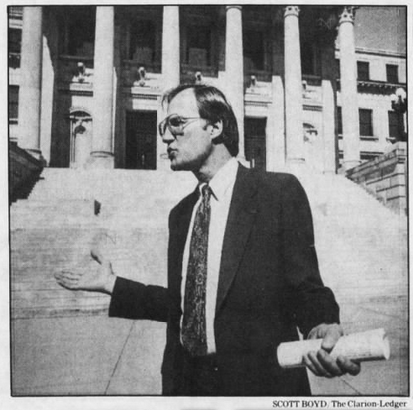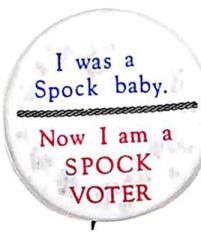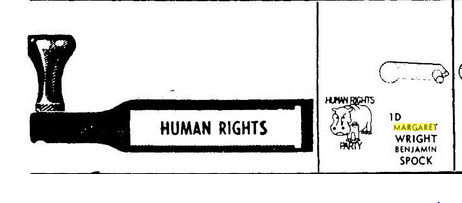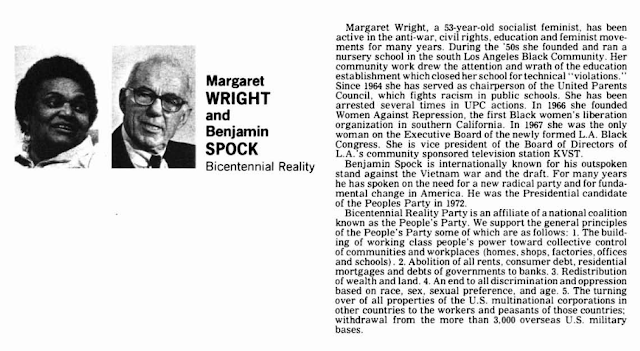Above: Mature and youthful Gilmore ; Below: Gordon H. Adkins in the news 1980, 1988
Billy Earl Gilmore, June 19, 1946 (Columbus, Miss.) - March 16, 2006 (Las Vegas, Nev.)
VP candidate for People's Party (1988)
Running mate with nominee: Gordon Hallman Adkins Sr. (b. 1936)
Popular vote: 0 (0.00%)
Electoral vote: 0/538
The campaign:
"God has assured me I will be the next person in the White House in 1989," so declared Presidential candidate Gordon H. Adkins in Feb. 1986, at the same time his brief multiple marriage had come to an end. He was running under the People's Party, which had no connection at all with earlier parties of that name. Adkins said God was also his campaign manager.
He had previously run in 1980 but apparently without a VP. God had informed him on Feb. 13 or 14 (accounts vary) 1980 that Adkins needed to begin his quest for the Presidency. He declared, "God told me I would do greater works than any other man in the history of mankind other than Jesus Christ." As he campaigned a nasty little habit the candidate had developed of writing bad checks for hotel and other services kept cropping up in the news. In Illinois he was handcuffed and led to jail only a month into his 1980 campaign.
Adkins was in fact an ex-convict based in Dallas, Tex. He had served time from June 1981 to Dec. 1984 in Huntsville, Tex. for purchase and resale of oil field equipment involving a $10,000 swindle and bad checks. He had just been released from parole in Oct. 1985. Before that he had been convicted of mail fraud in 1967.
God told him to run again in 1988. His method of addressing voters was to attend services in various churches and then give his electioneering pitch to members of the congregation when testimony time arrived, much to the chagrin of many pastors. Adkins would later claim that by allowing him to speak the ministers were endorsing him, forcing the ministers to go to the media to contradict the story and set the record straight.
His 1988 running mate was announced in 1986. Billy Gilmore, a Las Vegas pastor, community activist, and hotel bellhop was described by Adkins thusly, "My choice ... is what some people call a black man. But to me, everyone's the same color. There are just different degrees." The story of how Adkins and Gilmore came to know each other was never revealed. Considering how Adkins had gained "endorsements" from clergy, it does cross the mind that perhaps Gilmore himself was not a willing Vice Presidential nominee.
In Mar. 1986 Adkins was arrested in Oklahoma City when he said he couldn't pay his hotel bill at the Sheraton Century Center Hotel. A ferret that he had with him was placed in an animal shelter. Also in March a hitchhiker he picked up and appointed as a "campaign aide" was captured by immigration agents as an illegal alien. Later in March he was arrested and jailed in Sioux Falls, SD for failure to pay his hotel bill. His response, "I've been arrested because the Devil doesn't want the truth to go forth in Sioux Falls."
In Apr. 1986 he was told to leave the Texas Christian University campus in Fort Worth. Most of June 1986 was spent in jail in Washington DC, once again the consequences of an unpaid hotel bill. Meanwhile he skipped out on showing up in court for his Oklahoma City trial. In Nov. 1986 the court in Sioux City issued a warrant for his arrest since he failed to show up for that court date.
Current news coverage of Adkins, which had been fairly copious for a candidate so obscure, came to a grinding halt at the end of 1986. The reason for this was although no announcement was made, the nominee of the People's Party had fled to Mexico, where he remained until 1992. It seems he also served time in a Mexican prison for financial crimes.
Choice quotes from Adkins:
There is no question about my chances. I will be the next President. God has promised me. It is not my desire to be President but God has called me to this task and He will see it through to a successful finish.
I'm not an independent candidate, but a dependent -- first of all on God and then on my fellow man.
By all measures of reason my running for President is absurd. But so was Christopher Columbus' mission. That was laughable too, wasn't it?
By the way, they laughed at Columbus. And there's a lot of people that have laughed at me. And there's going to be a lot of people who continue to laugh. But they are going to stop laughing at me. The laughter is growing dimmer, quieter, as God elevates me.
All of the issues that confront us in America can be addressed and resolved through applications of faith in the word of God.
It is the goal of the People's Party to cause our nation to return to the laws of God, and the present position of separation of church and state leaves a little bit to be desired.
I hear Him every day. I also hear the voices of other spirits. This morning, God told me to be very sensitive to His lead.
The Lord's Prayer says 'Thy kingdom come, Thy will be done on Earth as it is in Heaven.' The People's Party is a vehicle to usher in the kingdom of Heaven on Earth.
Our country has become a dirty garbage can.
On the deficit: We should cancel out the debts of those who owe us and we'll trust God to take care of the other side of the coin.
On women in government: Women are not to be in authority except over children ... [He also said non-Christians should not hold key government posts]
On women in journalism: I'm not saying that a woman doesn't have creativity, flair, style, expertise. She might be a tremendous writer ... but if there has to be somebody to make a decision from an authority standpoint in dealing with you at this paper, it should be a man.
Psychology is of the Devil.
I can understand that you might think I'm a bit of a kook. But if it [his election] really happens, would you not then really listen pretty seriously to what I say?
America is a greedy country and we created this [Libyan] situation. We're trying to impose our philosophies on other countries.
On Ronald Reagan: I'm not his judge, yet the spirit of God reveals to me the man is a hypocrite. Mr. Reagan lives for a selected few.
On Jimmy Swaggart: We need to tell the country to repent, and we need somebody to do that other than a Jimmy Swaggart, who says do this and send your check to me.
On the major political parties: They are both unrighteous parties, and the reason I say that is that they are partial parties. They are showing partiality. The Republican Party is the party for the rich, while the Democrats say they are the party for the common man. You see? The People's Party is for all the people.
Adkins sometimes hitchhiked, other times was able to fly (frequently in private planes) to destinations in his campaign. The funding was always mysterious, according to the press. VP Gilmore did not seem to be active in the campaign and one wonders what he thought about Adkins' criminal antics. Needless to say the Adkins/Gilmore ticket was not on the ballot in any state and if they had somehow won the election the Presidential nominee's refugee and probable convict status in Mexico at Inauguration time might have posed a Constitutional problem.
After returning to the US from Mexico in 1992, Adkins filed with the FEC in 1994 for a Presidential run in the 1996 election, still using the People's Party as his standard. He was arrested shortly after his filing as a result of numerous outstanding warrants, an action in June 1995 that seems to have ended his third Presidential campaign. Adkins appears to have been married in Dallas in Sept. 1996, arrested in Fort Worth for skipping out on a hotel bill in Nov. 1997, and then vanishes from history.
Election history: none
Other occupations: US Marine Corps, pastor, bellhop at Las Vegas Hilton, established Friendship Church of God in Christ, Director of Friendship Child Care Center, founder of the Church of God in Christ Prison Ministries (1974-1985), Radio Ministry (1985-1989), member of the Governor Bob Miller Clergy Council (1989), member of the Bureau of Alcohol and Drug Abuse Council.
Buried: Southern Nevada Veterans Memorial Cemetery (Boulder City, Nev.)
Notes:
Moved to Las Vegas as a child in 1953.
Decided to devote his life to religion in 1968






















































